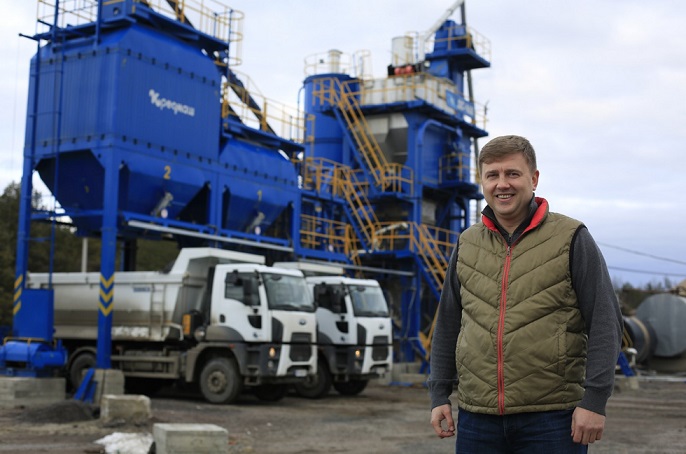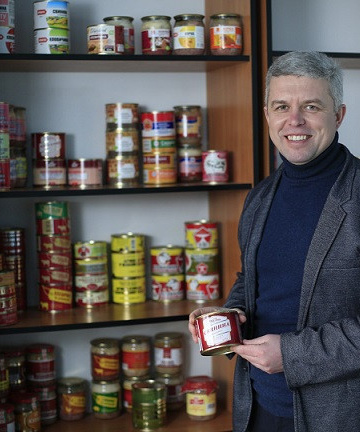
How Ukrainian entrepreneurs receive concessional financing thanks to EU loan programmes
Focus magazine, together with the EU Delegation in Ukraine, is launching a special project on the opportunities for small- and medium-sized enterprises (SMEs) available in the country thanks to EU programmes. Focus will tell the real stories of entrepreneurs who have received funding and acquired the necessary knowledge to start and develop their own business. The magazine will not only include stories about how to launch a business in Ukraine, but also how to conquer the European market with support from the EU.
Limited access to loans is one of the main factors hindering the development of SMEs in Ukraine. The interest rates offered to Ukrainian entrepreneurs are much higher than those offered to their European counterparts. Fortunately, the situation has been improving lately, and this is largely thanks to partner assistance from the European Union. One example is the EU4Business initiative in Ukraine, which aims, among other things, to provide access to finance for SMEs in Ukraine. It involves seven Ukrainian banks, which, in partnership with international financial institutions, offer concessional lending to SMEs – with part of the total loan amount or interest rate compensated by the project’s European partners.
Focus, together with the European Union, gives the stories of three Ukrainian entrepreneurs who have made their dreams come true thanks to the low interest rate loans offered by European partners.
Happiness is a new idea
In Soviet times, the Rhythm factory in the Chernihiv region produced sausages for the whole of the USSR. But Rhythm failed to withstand the rhythm of life in an independent Ukraine and its output decreased year on year. In 2010, the factory was rented by the Chernihiv-based company Zdorovo, which manufactures canned meat. “The first four years were very difficult,” recalls Vladimir Dasyuk, the director of Zdorovo. Not only was the old equipment unsuitable for producing the desired quality, it was also extremely energy intensive. The cost of the product was rising, and the company was not working smoothly. As a result, Zdorovo changed its owner in 2014.
“With the advent of the new owner, we have focused on the production of premium canned goods,” says Dasyuk. It takes a lot of manual labour to manufacture such products, and only fresh, chilled meat can be used, not frozen.
The company’s new directions required significant changes in technology. As Dasyuk explains, the set of technical standards (GOST) dating back to Soviet times was completely unsuited to the production of quality products. Everything had to be started again from scratch, which required additional space and equipment. The company began to search for premises but did not have its own funds to buy a suitable production facility. Commercial banks, meanwhile, offered loans with an annual rate of 20-25%. For a small company, borrowing at such rates was unsustainable.
But where there’s a will, there’s a way. One of the partners recommended focusing on banks that provide funding under the EU4Business initiative. Negotiations began with ProCredit Bank, which finances SMEs under the German-Ukrainian Fund programme as part of the EU4Business SME Finance Facility.
Zdorovo was initially cautious about the proposal, because the bank did not have a branch in the Chernihiv region and the company knew almost nothing about the financial institution. After weighing up all the pros and cons, however, they decided to take out a loan. The Chernihiv company received UAH 2.6 million at 14% per annum, a rate that it was happy with.
The loan covered about 60% of the cost of new premises with a total floor area of 5,600 square metres, but the building was only half of it. The production facility previously belonged to a confectionery plant and the equipment that came with it was unsuitable for meat production. Once again, the entrepreneurs turned to the bank. A concessional loan for UAH 1.9 million was agreed in less than a week. This money was used to purchase industrial pressure cookers and equipment to glue the labels onto the finished product.
The loan has since been justified. Thanks to its investment, Zdorovo’s turnover has started to show stable growth. Since 2016, it has grown by 240% to UAH 100 million. “Last year, we began to work at full capacity, with all repairs and redevelopment finished,” explains Vladimir Dasyuk.
The upgraded production facilities have allowed new distribution channels to be established. Around 25% of Zdorovo’s products are accounted for by public procurement. Energy-efficient equipment allows the company to reduce production costs and win tenders. The Chernihiv company supplies canned pork to the army and to educational institutions. Partnerships have also been established with large retail chains that manufacture products under their own trademarks using the company’s production facilities. Some of the company’s key customers include retail chains like ATB, Silpo, Tavria B, Nash Kray, and Rukavychka.
As of February 2019, the company has already repaid more than half of the total loan amount. Now, the company is thinking about taking out a new loan to invest in another production line. This will allow the company to expand its sales geography and enter EU markets – for European money.
The Haisynskyi Molokozavod company has a similar story. Ukrainian entrepreneurs are often wary of loans, preferring to invest their money in development. However, this dairy company’s experience shows that careful planning in the use of a loan can be more profitable than freezing working capital.
After learning about the benefits of borrowing money under the EU4Business programme, Taras Osadchyi, the director of Haisynskyi Molokozavod, took out a loan of UAH 2.4 million to purchase milk separators. In addition, the company makes use of the bank’s overdraft facility. Extended financing helped the company manufacture dairy products in accordance with European requirements and gain ground in the highly competitive domestic market.
Under asphalt
“Want to understand how successful your business will be? Then ask yourself a simple question: why do you, personally, need your product?” says Vitaliy Koval, the director of the Montazh road construction company, sharing his personal credo. For Koval himself it’s a no-brainer. He is a motorist and is in no doubt that the country needs high-quality asphalt, a lot of high-quality asphalt.
Koval has been interested in asphalt production for a long time, and, in 2016, he got together with a few friends and founded an asphalt factory. “We had bitumen, which is 50% of the cost of asphalt. The creation of an asphalt plant was a natural stage in the development of the business,” he explains.
Koval and his partners invested UAH 60 million in production, and the plant was put into operation in 2017. Montazh began to participate in, and win, tenders, and its first big orders appeared, along with big problems. “We were lacking dump trucks for crushed stone. We used to lease them, but, at the peak of the construction season, there was an acute shortage of contractors. We decided to buy our own machinery so that we would not be dependent on anyone,” says Koval.
The company began to check out machinery and the entrepreneurs liked Ford dump trucks the most. But the young company did not have the available funds; however, neither could it afford to wait. In 2018, a Road Fund was set up. Fifty per cent of the excise tax from fuel duties now goes towards the reconstruction of highways, so the country is experiencing a real boom in roadworks. This is an opportunity for a small company to contribute to such an important endeavour. “Almost everything can be done using our own money, but there is a risk of missing something important. Right now, there is a real possibility of breaking into the roadworks market, but in a couple of years, large international companies will be dividing it up amongst themselves,” says the businessman.
At the Ford office, the entrepreneurs were advised to contact one of the banks operating under the EU4Business initiative. They chose OTP Bank, which, together with the European Bank for Reconstruction and Development (EBRD), finances SMEs as part of the EU4Business – EBRD Credit Line programme. The bank granted a loan of UAH 5.6 million and EBRD issued a non-repayable grant – worth 10% of the total loan amount.
Purchasing the machinery allowed Montazh to triple its turnover in a year – from UAH 50 to 177 million per year – and Koval intends to at least double this in 2019. “Especially thanks to the decentralization and existence of amalgamated communities, we receive more and more orders,” says Koval. Montazh plans to apply to the bank for more loans, although Koval is keeping the details close to his chest for now. But if his predictions turn out to be true, such growth rates will allow him to forget about his biggest problem – bad roads.
This article first appeared in Focus magazine on 25.02.19

